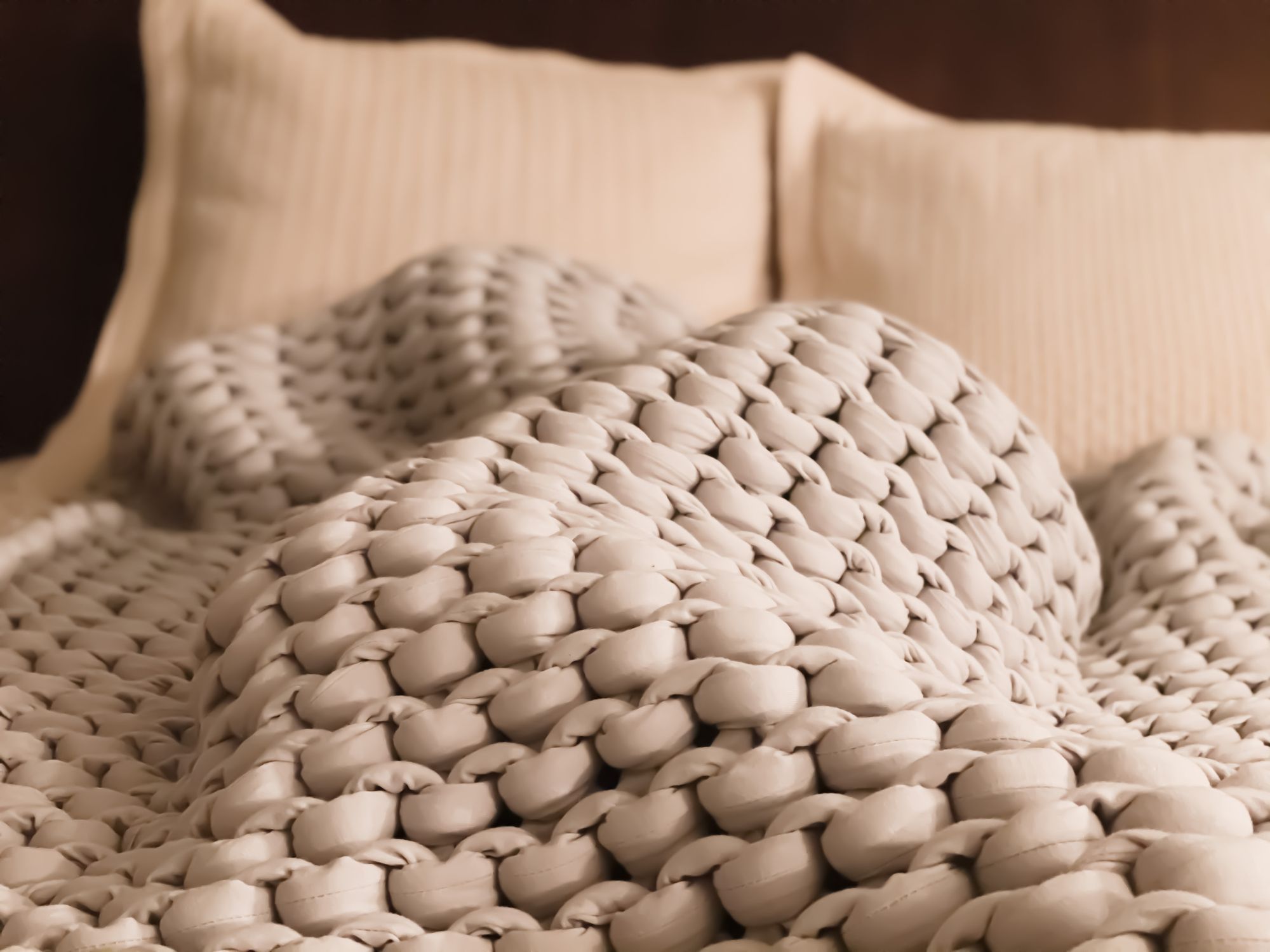Do Weighted Blankets Work?
We weigh the evidence. What the science shows, how and why do weighted blankets work?

For a restful, restorative night’s sleep, it’s important to find a wind-down routine that lets you leave the weight of the world behind. Unless of course it’s a weighted blanket you’re bringing into bed, which could actually help you sleep more soundly.
You’ve probably heard about weighted blankets. Maybe it was from a friend who raved about how well they’ve been sleeping. Or a colleague whose child now goes down without being read their favorite story three times. And you might be wondering, how do weighted blankets work?
Well, how do weighted blankets work?
Weighted blankets are designed to be heavier than regular blankets. They’re inspired by a therapeutic technique called deep pressure stimulation, which uses firm, controlled, hands-on pressure to quiet and calm the nervous system and promote a feeling of relaxation. Professionals such as occupational therapists have long used deep pressure touch to help calm children with autism spectrum disorders.
Weighted blankets are thought to work in the same way that a tight swaddle helps newborns feel snug and cozy, or the way a hug from a loved one feels comforting (and stimulates the release of the “feel good” hormone oxytocin), or how a massage produces the physiological effects of relaxation and helps alleviate anxiety. A weighted blanket mimics this even amount of pressure on the body, helping to reduce autonomic arousal, which houses the body’s fight-or-flight response.
Why do they work?
The sensation of deep pressure is thought to produce a variety of hormonal responses that can help you fall asleep. Deep pressure stimulation is believed to produce serotonin, the hormone that helps to regulate mood, and melatonin, the hormone that helps you fall asleep. It’s also thought to reduce cortisol, the stress hormone—all of which may work to improve overall sleep quality.
Weighted blanket benefits
Many people find weighted blankets help them doze off more quickly by promoting a sense of security. They may help manage feelings of stress and anxiety, which often interfere with sleep.
“If we can feel more relaxed or less stressed at bedtime, our parasympathetic nervous system, i.e., our natural relaxation response, can kick in and help the process of sleep unfold. A weighted blanket could be one of those sleep environment tools that produces that effect,” says Dr. Jenna Gress Smith, PhD, sleep specialist in residence at Crescent Health.
What the science shows
Though there’s not yet a large body of research verifying the specific health benefits of weighted blankets, the studies that have been done are promising. They generally have shown that weighted blankets can be effective for reducing anxiety.
In one study, 63% of participants reported lower anxiety after using a weighted blanket, while almost 80% considered them to be calming. In another study of 32 adult volunteers, 63% reported lower anxiety after lying under a 30-pound blanket for 5 minutes. Yet another tested weighted blankets on 30 people who had been hospitalized for a mental health crisis, and 60% reported lower anxiety after using the blanket.
And a paper published in the Journal of Clinical Sleep Medicine concluded that weighted blankets helped relieve insomnia and other symptoms for people with major depressive disorder, generalized anxiety disorder, attention deficit hyperactivity disorder (ADHD) and bipolar disorder. Weighted blankets may also benefit children with ADHD: one study found that weighted blankets could reduce sleep onset latency — the time it takes them to fall asleep.
Sleep experts also say that weighted blankets can be particularly helpful for those with restless leg syndrome.

Promising research, and 5-star reviews
As studies continue to explore the benefits of weighted blankets, plenty of people say that they have helped them get better-quality sleep. Weighted blanket use has exploded in recent years because people find that they work—even if the blanket simply distracts you from anxious thoughts by focusing your attention on the physical sensations.
“Even though there’s not a lot of data about weighted blankets as a tried-and-true evidence-based treatment for insomnia,” says Dr. Gress Smith, “if you find it helps with anxiety, stress, and pain — that can only help improve your sleep overall.”
But weighted blankets don’t work magic: You still have to practice good sleep health habits. And if you experience persistent sleep problems, or problems with anxiety, it’s a good idea to talk with a doctor, who can best assess your situation and determine whether a weighted blanket could be an effective part of a comprehensive treatment.
Are weighted blankets safe?
Weighted blankets are generally considered safe, as long as the person using the blanket has enough strength and physical dexterity to lift the blanket off of themselves. However they may not be suitable for people with certain medical conditions, including chronic respiratory or circulatory issues, asthma, low blood pressure, Type 2 diabetes, or claustrophobia.
Experts also recommend that people with obstructive sleep apnea (OSA) avoid using weighted blankets because the weight of the blanket may restrict airflow. Though there are some weighted blankets specifically designed for children, infants and toddlers should not use weighted blankets as they may become trapped underneath.
How to choose a weighted blanket
Most people seem to prefer a weighted blanket equivalent to about 10% of their body weight, though you should take your own preferences into account. Blankets are sold in weights ranging from around 8 pounds to 25 pounds, and typically come in standard bedding sizes such as full, queen, and king. Some manufacturers also make child- or travel-size options.
The size of the blanket doesn’t need to match the size of your bed. If you plan to use it for curling up on the couch, a smaller, throw-size (think twin- or full size) may be more manageable.
Which weighted blanket is best?
Studies show that sleeping in a cold/cool room will keep your core body temperature lower, which can help you fall asleep faster, reduce nighttime sleep interruptions, and generally promote better overall sleep.
While many weighted blankets are made of large swaths of fabric filled with glass or plastic beads for heft, some newer styles such as those from Nuzzie and Bearaby add the weight into an open knitted weave, which allows air to circulate and won’t trap heat. You get the benefit of that comforting hug feeling without compromising your sleep. The chunky knit makes these blankets look just like a stylish throw, and importantly, both are machine washable.
